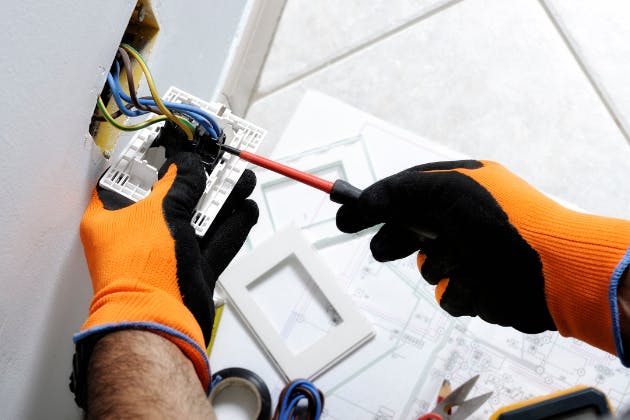There are quite a few distinctions involved when it comes to the differences between commercial and domestic electricians. The main variance between both types of electricians are:
- They have different load demands.
- They had different energy requirements.
- They have different equipment configurations.
The different tasks stated above all require contrasting materials and procedures. This in turn, will determine whether a domestic or a commercial electrician is required for the job to be completed. If you are unsure which sort of electrician is needed, please don’t hesitate to contact our electrical services department here at Resistance Electrical in Brighton. Our local electricians are fully qualified to ensure that any job, big or small, is carried out to the highest standard safely.

What other factors are important?
Other important factors that distinguish between commercial and domestic electricians are:
Power
A commercial building will require a different electrical load than a domestic one. The size of a building and its use will determine whether a one-phase, two-phase or three-phase power circuit is required. For example:
- Residential homes require a one-phase circuit at 120 volts of electricity.
- Larger residential homes that use more energy require a two-phase circuit, such as 240 volts of electricity.
- Three-phase wiring is required for all commercial buildings.
Installation
In our homes, electrical wiring is installed before the drywall is placed on top. This then covers any pipework and wires. Domestic electricians will do this because maintenance is often very uncommon. It is also a lot safer and is more aesthetically pleasing to the eye. Ducting, however, is often used in commercial buildings. Replacements, renovations and repairs are required more often, thus making the electrical wiring a lot more accessible to our electricians.
Type of equipment used and wiring
A domestic electrician will use different wires than commercial electricians. This is because commercial and domestic structures are different. Domestic electricians use plastic-coated wires. Plastic-coated wires are:
- Safer
- More flexible
- Protects the cables from damage
Commercial wiring is different. It is often contained in ducting for ease of access for our electricians. Another difference is that commercial wiring is more heavily insulated because it may need to be protected from corrosive gases and liquids.
Technical differences
The main difference between commercial and domestic electricians is that they require a different set of technical abilities and regulations to follow. This is why it is so important to have the right electrician to do the job. For example, domestic electricians install or repair home lighting and electrical appliances. As commercial electricians work in industrial settings, such as:
- Schools
- Hospitals
- Shopping centres
- Train stations
Speak to an electrician
Our commercial and domestic electricians here at Resistance Electrical are all highly experienced and fully qualified. With massive variations in equipment and knowledge, it is vital that companies like ours offer all the different relevant electrical services.
If you require either commercial or domestic electrical work to be carried out, please contact our local electricians at 07935923323.



